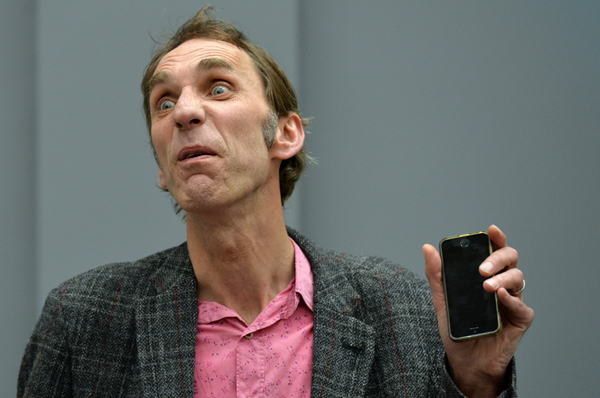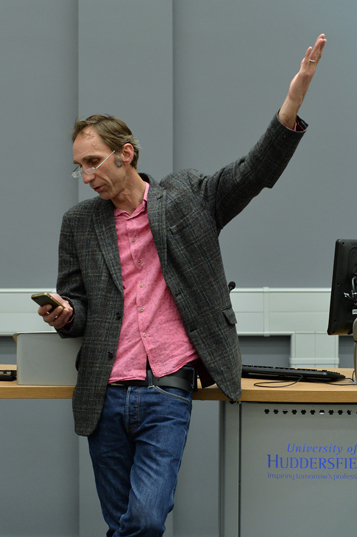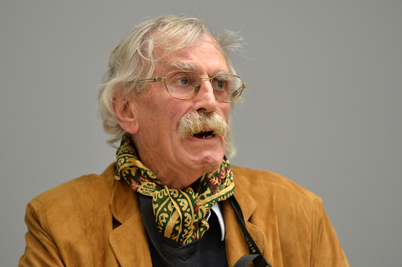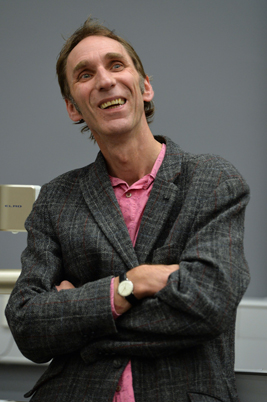Will Self delves into war, technology, morality and psychology

Thu, 12 Nov 2015 13:42:00 GMT
The acclaimed author delivers the University’s inaugural J.B. Priestley Lecture
 A TOUR-de-force from novelist and broadcaster Will Self (pictured right) launched a new University of Huddersfield lecture series commemorating famous Yorkshire author J.B. Priestley. A packed audience heard a talk that delved deeply into war, technology, morality, psychology and 20th century history – and there was a provocative analysis of the “hysterical” dimension of contemporary Remembrance.
A TOUR-de-force from novelist and broadcaster Will Self (pictured right) launched a new University of Huddersfield lecture series commemorating famous Yorkshire author J.B. Priestley. A packed audience heard a talk that delved deeply into war, technology, morality, psychology and 20th century history – and there was a provocative analysis of the “hysterical” dimension of contemporary Remembrance.
In attendance at the lecture was the son of J.B. Priestley, the leading film editor Mr Tom Priestley (pictured below left), who thanked the University for inaugurating the series.
 Will Self wove many references to J.B. Priestley’s life, work and ideas into his lecture and he focussed on the Bradford-born author’s “bitterly ironic” experience of combat in World War One, the conflict that “sowed the seeds of darkness and absurdity that dominated the 20th century” and caused an “incredible harrowing of the British male population”.
Will Self wove many references to J.B. Priestley’s life, work and ideas into his lecture and he focussed on the Bradford-born author’s “bitterly ironic” experience of combat in World War One, the conflict that “sowed the seeds of darkness and absurdity that dominated the 20th century” and caused an “incredible harrowing of the British male population”.
The lecturer drew a parallel between the age of mass production inaugurated by Henry Ford in 1913 and mass slaughter in the trenches of WWI, where the 350-mile defensive line in France was an “assembly line of death” that mimicked Ford’s factory.
J.B. Priestley’s insight was that mankind’s mastery of technology was not matched by increased levels of wisdom and morality in society, according to Will Self, who spoke of the “mechanical ague that gripped the human spirit in the late 19th and early 20th centuries”.
Today’s new digital technology represents a step change just as significant as the developments of the early-20th century, said Will Self. “It is taken for granted that technology is something we designed and so we can control it. But I think technology is just something that happens to us.”
 Delivering his lecture on the evening of Remembrance Day, Will Self spoke satirically about the “poppy-wearing, Corbyn-bashing, trident-waving” tendency and recalled that J.B. Priestley’s most deeply-felt experience in World War One was the violent death of comrades.
Delivering his lecture on the evening of Remembrance Day, Will Self spoke satirically about the “poppy-wearing, Corbyn-bashing, trident-waving” tendency and recalled that J.B. Priestley’s most deeply-felt experience in World War One was the violent death of comrades.
“Remembrance Day is all about remembering people personally, but it has become a bit hysterical because there are now few people that have lost comrades in war. It is difficult to remember something you never experienced,” said Will Self, who alleged that “the whole panoply, ceremony and ideology of Remembrance” was used to bolster a “state-mandated death cult” leading to aggressive actions, such as bombing in Syria.
The lecturer discussed J.B. Priestley’s fascination with theories about time that were current in the 1920s, and there are echoes of this in his own work. Will Self discussed some of the themes of psychology and warfare that have influenced his new trilogy of novels, which draw on themes and episodes from the two world wars. He concluded his lecture by reading a passage from the novel Shark, inspired by the deaths of hundreds of US seamen when the warship Indianapolis was sunk by a Japanese submarine shorty after it delivered components for the nuclear bomb that would be dropped on Hiroshima.
The first J.B. Priestley lecture was introduced by the Deputy Vice-Chancellor of the University of Huddersfield, Professor Tim Thornton.
“To inaugurate the series we had to find a present-day Priestley. There were several candidates, but none more qualified than Will Self. His literary fiction has a lacerating edge and is often experimental, but it also has a humorous and fantastical dimension – not unlike some of Priestley’s works.
“But where Will Self really scores on the Priestley scale is his status as a public author and broadcaster,” said Professor Thornton.







